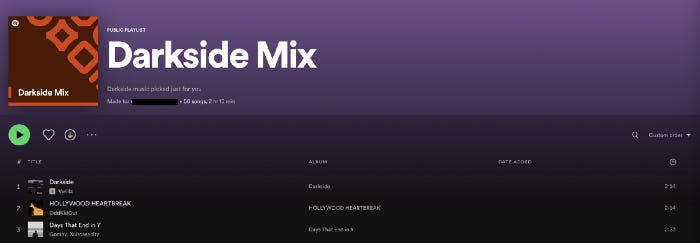This Week On The Desk
Spotify’s “Discovery Mode” explained 📰
Signings ✍🏾 - G-Eazy
Creative($) of the week 👩🏽🎨 - dickbyair
Links 🔗
Happy Holiday 🎄🎅🏾
Spotify’s “Discovery Mode” explained
As it stands, discovery mode is still in beta and being tested by a small group of artists and distributors. Word on the ground is that distributors and teams like EMPIRE, Crush Management, and Tunecore love the idea, while the labels (Sony, Warner, and UMG) seem to hate it.
Labels argue discovery mode will create a race to the bottom and dillute their streamshare. In response, they’ve been quick to label it “payola” even though they’re the one’s who covertly engage in the practice on a regular basis.
Distributors counter, arguing it levels the playing field.
I’ve included a semi-accurate list of publicly available beta-testers for discovery mode below:
ODIE (Empire)
mehro (Independent)
Natalie Perez (UMG + Warner Music Chile)
Terrace Martin (Empire / Crush Management)
You’ll notice only one major record label (which was either UMG or Warner) opted to test “Discovery Mode” and be publicly associated with the early case studies being touted on the Spotify For Artist homepage.
What’s been unclear about “Discovery Mode” is how and where they’re algorithmically recommending an artists’s song or wider album.
The answer comes down to Spotify radio + autoplay.
The best way to explain these concepts is through example:
Assume you’re listening to “Ty Dolla Sign Radio” on Spotify through the mobile app. Also assume that you’re an independent artist that has released a single that sounds similar to something Ty Dolla Sign would release on Atlantic Records. With discovery mode on toggled on, Spotify will recommend your independent artist single next to artists inside of Ty Dolla Sign’s algorithmically generated radio station.
Based on a user’s reaction (did they save the track, choose to skip it before the 30 second mark, add it to their own personal playlist, or replay it again) it will factor into whether or not Spotify will continue to recommend the song, much like Release Radar and Discover Weekly.
Spotify can also accomplish recommending tracks to users through personalized listening sessions, which can include playlists like “Made For You” that you’ll see appear regularly on desktop + mobile.
“Darkside Mix” is a good example:
A third (little talked about) but powerful algorithmic method is “playlist radio based on” a regular playlist a user would make.
I’ve included an example below:
Algorithmic playlists like these will serve up a “recommended” track once you’ve exhausted all or a portion of the playlist you’ve created as a user.
Finally, in addition to radio and personalized listening formats, Spotify accomplishes recommending tracks in non-personalized listening sessions through autoplay. Autoplay is a feature that allows Spotify to automatically play a track when you reach the end of an album, single, or playlist. Spotify gives you the option to turn this feature on or off through “Settings” under playback. This feature comes standard on most Spotify user accounts.
For discovery mode to “work” and produce meaningful results for independent teams and distributors, Spotify will have to solve for risks like subscriber churn and decreased user engagement on the algorithmic side.
Like it or not, objectively bad music exists in volume on Spotify.
How they address the problem of “bad” music being recommended to their users through discovery mode is unclear.
What’s clear is not every artist will be able to use it.
One solution on offer is limiting the use of discovery mode for a qualified set of artists based on a.) who their distributor is or b.) how many monthly listeners they currently have, a la Marquee. Most distributors have minimum thresholds, which creates a built in element of quality control.
Signings ✍🏾
G-Eazy signs with Bad Habit
G-Eazy has signed with Bad Habit's Kirk Harding, Matthew Adesuyan & Ryan Armes for management.
Creative($) of the week 👩🏽🎨
dickbyair - DJ | Instagram
Links 🔗
#WhoeverNeedsToHearThis
You are where you choose to be - Aldis Hodge














